
The Unapologetic Anthem of the Common Man’s Resilience
Released on August 6, 1990, as the lead single from his monumental album No Fences, Garth Brooks’ “Friends in Low Places” wasn’t just a song; it was a seismic event that reshaped the landscape of country music. It quickly ascended to the pinnacle of the charts, spending four consecutive weeks at number one on the Hot Country Songs chart, commencing October 6, 1990. This instant classic garnered both the Academy of Country Music and Country Music Association awards for 1990 Single of the Year, solidifying its place in the pantheon of country music’s most celebrated tracks.
The genesis of “Friends in Low Places” is a tale steeped in the very down-to-earth camaraderie it extols. Penned in 1989 by the masterful songwriting duo Earl Bud Lee and Dewayne Blackwell, the song’s core concept reportedly emerged from a simple, relatable predicament. Legend has it that Lee, while at a Nashville eatery, found himself without his wallet. With a shrug and a smile, he quipped to his companions, “Don’t worry, I’ve got friends in low places – I know the cook.” This offhand remark, brimming with an inherent understanding of humble connections, lodged itself in the minds of the songwriters. Months later, at a different gathering, the phrase resurfaced, and the full narrative of the song began to unfurl, famously written on napkins as the inspiration flowed.
The song tells the story of an uninvited guest crashing a sophisticated, black-tie affair—presumably the wedding of an ex-lover. The protagonist, unapologetically clad in boots, stands as a defiant symbol of authenticity amidst a sea of pretense. The opening lines, “Blame it all on my roots, I showed up in boots / And ruined your black tie affair,” immediately establish the central conflict and the protagonist’s steadfast refusal to conform. This character, perhaps heartbroken but certainly unbowed, toasts not to the new couple’s future, but to his own resilience and the solace found in genuine, unpretentious company. The titular “friends in low places” are not those of high societal standing or influence, but rather the companions found in the unvarnished honesty of a honky-tonk, where “the whiskey drowns and the beer chases my blues away.” This phrase, an inversion of “friends in high places,” speaks volumes about where the protagonist finds true belonging and comfort: among those who understand and accept him, flaws and all, without judgment.
Garth Brooks’ rendition, recorded in 1990, infused the song with an undeniable energy and authenticity that resonated deeply with audiences. It was, in many ways, a perfect match of artist and material. Brooks, still a rising star when he first demoed the song, saw its potential. His powerful vocals and charismatic delivery brought the defiant spirit of the lyrics to life, transforming it into a communal anthem. The recording itself, with its robust backing vocals and even the subtle, authentic sound of a beer can opening, captured the raucous, celebratory atmosphere the song evokes.
“Friends in Low Places” became more than just a hit; it became a cultural touchstone. It celebrated the everyman, the underdog, and the enduring spirit of camaraderie found in unexpected corners. It tapped into a universal sentiment of finding solace and acceptance among those who truly understand you, regardless of societal status. The song’s enduring popularity is a testament to its timeless message and its ability to connect with listeners on a deeply emotional level, reminding us that sometimes, the most valuable connections are found not in the “high places,” but in the comforting embrace of “low places.” Its legacy is etched not just in chart statistics and awards, but in the countless singalongs in honky-tonks and gatherings worldwide, where its chorus becomes a powerful, shared declaration of belonging.